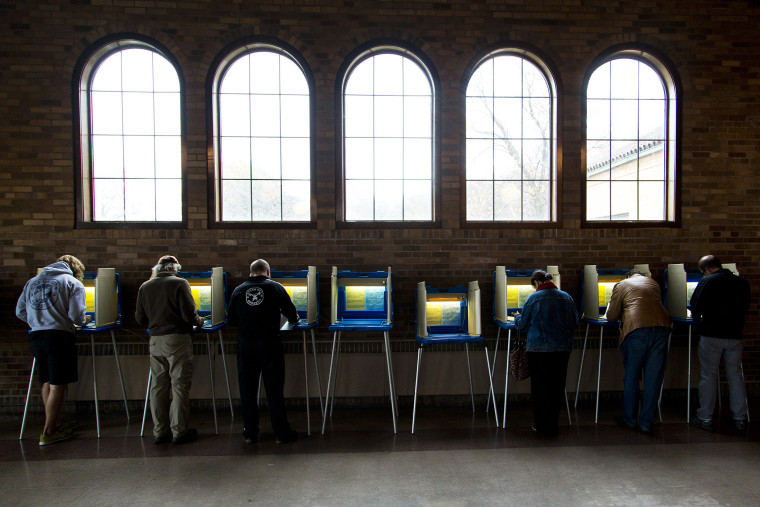The recently concluded midterm elections cost billions of dollars, generated thousands of different headlines and resulted in Republicans winning control of the U.S. Senate.
But it didn’t change much else -- especially the public’s attitudes about politics in Washington, D.C., according a new NBC News/Wall Street Journal poll. Consider:
- More than three-quarters of Americans say the election won’t substantially change the nation’s direction.
- More say they have less confidence that elected leaders in Washington will start working together to solve problems.
- And Americans are split almost evenly between positive (41%) and negative (39%) reactions to Republicans controlling both the House and Senate next year.
A sampling: “A good thing,” “About time,” “Complete disaster,” “Awful,” “I guess we’ll see,” “Indifferent.”
“While this wave election has changed the composition of Congress and added Republican governors, it has not changed the nation’s psyche or their expectations,” says Democratic pollster Fred Yang of Hart Research, who conducted this survey with the Republican pollsters at Public Opinion Strategies.
"It is almost like the election never happened."'
Indeed, about two-thirds of Americans continue to say that the nation is on the wrong track; President Obama’s approval rating remains in the 40s and a majority still thinks the nation’s economic and political systems are stacked against them.
“It is almost like the election never happened,” Yang adds.
Breaking down the numbers:
What election?
- A combined 76% say there will be "just some change" or "not that much change" as a result of the election. By comparison, only 21% say it will result in “a great deal of change” or “quite a bit of change.”
- Similarly, more respondents said they had less confidence (32%) that politicians will start working together, versus those who had more confidence (26%). A plurality (40%) said they election made no difference here.
Obama
- 44% of adults approve of his job -- his highest marks since April 2014. (Note: This is among adults; our polls leading up to the election had it among registered voters.)
- His fav/unfav rating is right-side up at 45%-43% -- the first time it’s been above water since April.
Immigration
- By a 48%-38% margin, Americans disapprove of Obama taking executive action on immigration.
- But it breaks along partisan lines -- 63% of Democrats approve, versus 11% of Republicans and 37% of independents.
- Still, 57% favor a pathway to citizenship for undocumented immigrants, and that increases to 74% when respondents are told that such a pathway requires paying fines/back taxes, passing a security background check, and taking other steps.
More post-election numbers
- Respondents feel positive about the election results by a 53%-40% margin, but that’s lower than it was after the 2010 midterms (61%-33%) and 1994 midterms (69%-23%).
- Most want Congress to take the lead role in setting policy for the country (56%), versus those who prefer President Obama here (33%).
- 53% say it’s likely that Obama will work with congressional Republicans to get things done, while 44% say it’s likely that GOP leaders will work with Obama.
- By a 63%-30% margin, Americans want their elected candidates to make compromise instead of sticking to their campaign positions.
- And 46% are more concerned that Obama won’t make the adjustments voters want, compared with 44% who are more concerned that Republicans will go too far.
What should the next Congress do?
- 82% support Congress providing access to lower the costs of student loans
- 75% support increasing spending on infrastructure, roads, and highways
- 65% support Congress raising the minimum wage
- 60% support approving emergency funding to deal with Ebola in West Africa
- 59% support addressing climate change by limiting carbon emissions
- 54% support building the Keystone XL pipeline
- 49% support eliminating most tax deductions in return for lower tax rates
- 49% support authorizing the use of U.S. troops to fight ISIS in Iraq and Syria
- 44% support reducing Medicare and Social Security benefits for wealthier retirees
- 44% support making new trade agreements with selected Asian nations
- 41% support cutting funding for the health-care law
- 39% support creating legal status for immigrants who are in the U.S. illegally.
- 34% support gradually raising Social Security’s retirement age to 69 by 2075
2016 favorability ratings
Finally, our poll tested the fav/unfavs of many of the potential 2016ers.
Among all respondents:
- Ben Carson 17%-7% (+10)
- Elizabeth Warren 23%-17% (+6)
- Hillary Clinton 43%-40% (+3)
- Rand Paul 26%-23% (+3)
- Marco Rubio 21%-19% (+2)
- Mike Huckabee 25%-24% (+1)
- Scott Walker 15%-14% (+1
- John Kasich 11%-10% (+1)
- Chris Christie 29%-29% (even)
- Joe Biden 35%-38% (-3)
- Jeb Bush 26%-33% (-7)
- Rick Perry 20%-29% (-9)
- Ted Cruz 16%-26% (-10)
Among Democrats:
- Hillary Clinton 78%-5% (+73)
- Joe Biden 62%-9% (+52)
- Elizabeth Warren 36%-6% (+30)
Among Republicans
- Huckabee 52%-8% (+44)
- Rand Paul 48%-6% (+42)
- Jeb Bush 44%-12% (+32)
- Ben Carson 33%-2% (+31)
- Marco Rubio 37%-7% (+30)
- Scott Walker 29%-2% (+27)
- Chris Christie 40%-19% (+21)
- Rick Perry 33%-13% (+20)
- John Kasich 23%-6% (+17)
- Ted Cruz 27%-12% (+15)
